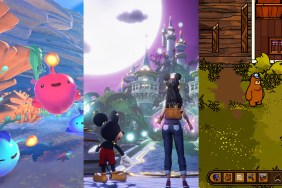Between the ages of eleven and seventeen, my cultural diet consisted of expensive anime DVDs, PlayStation RPGs, and constructing plastic Gundam models. Delicious, I know. My late discovery of Final Fantasy VII blossomed into an indiscriminate love for all things turn-based. Anime was always hard to come by and therefore cherished, shared amongst peers who had VHS tapes full of Toonami recordings. As for Gundam models, I just loved giant robots. I bring this up because after my brief playthrough with the latest build of Battle Chasers: Nightwar, I get a strong feeling of nostalgia.
Battle Chasers is a game built on a foundation of fondness for the past. Marketing materials tout “classic combat” set in a world straight out of a late-nineties JRPG. The game itself is a continuation of (Airship Syndicate CEO and Creative Director) Joe Madureira’s 1998 comic book series of the same name. With nostalgia and yesteryear the new cash cows of video game development, it’s not surprising that this game is being made in 2017. What is surprising, however, is just how much this game borrows from inspirations new and old. Nineteen ninety-eight is the black hole that sucks in the most popular video game mechanics of the last twenty years. Battle Chasers is the event horizon.
At its core, Battle Chasers is a turn-based RPG. Specifically, the kind of RPG one would have found on the PlayStation or Dreamcast. Player-controlled characters conveniently line up on the left side of the screen to wage a patient war with enemies on the right. Basic attacks are carried out immediately, while magic attacks will place a character’s turn farther down the line. Knowing where a character’s turn falls in line is essential, as even healing spells can be rendered useless by poor timing.

Battle Chasers is in love with meters. Meters for health and mana are there, as well as a Burst meter that carries over into the next fight. Some attacks and abilities will “overcharge” a character’s mana, which allows for additional spellcasting and supercharged attacks. The turn order is its own kind of meter, always on display and shifting depending on the actions taken. Battles are less about exploiting enemies’ weaknesses and more about stacking debilitating effects. Enemies can be poisoned, burned, afflicted with bleeding or just punched in the face.
None of these mechanics are particularly new. The first time I initiated a Burst attack, I watched the familiar over-the-top execution of a Final Fantasy VII Limit Break. Manipulating the turn order is straight out of the Final Fantasy X playbook—minus the Blitzball, thankfully. Stacking multiple damaging effects reminded me of the first two Penny Arcade RPGs; games that were also built with an eye for gaming’s immediate history. While borrowed from varying sources, none of these mechanics clash. However, at least in the early part of the game, none of them strived toward anything new or different either.
Exploring the game’s randomized dungeons brought a few more recent video game entries to mind. Before entering the demo’s main dungeon, I was given a choice of difficulty. Raising the stakes meant increasing the chances for better loot. Well, hello there Battle Chasers, or should I say Diablo III! The dungeon itself was a loose collection of random, pre-made tiles. Enemies can be seen patrolling in every room, and are fond of attacking while in the middle of reading a soldier’s journal entry. Each “room” is explored from an isometric view, which coupled with the game’s distinctive comic-book art style immediately reminded me of Bastion.

I even tried turning the volume on my headphones up just to make sure I was not missing any omniscient narration. Having the volume up did bring the game’s soundtrack to my attention. Ambient violins with the occasional plinks of an acoustic guitar. It was haunting and beautiful. It was also strangely familiar. Like, opening scene of Braid familiar. A few light Google searches later I confirmed that it was not the same song, nor the same composer. However, noted video game composer Jesper Kyd—of Assassin’s Creed fame—is on board, which may explain some of the familiarity.
Battle Chasers' most egregious borrowed mechanic may be its crafting component. Battles end not with the sweet shimmer of steel but instead the scraps to build it. I had not realized there was crafting in the game until I came upon a strange worktable in the middle of my dungeon exploration. It works like every other game before it. Hoard as many bits and pieces and hope to find enough to make a marginally better piece of armor. While the Minecraft generation may find this to be an integral part of any gameplay experience, I simply cannot piece together a suitable reason for it to exist (I can, however, write a very good pun).
I cannot say with certainty that Battle Chasers: Nightwar borrows from all of these influences to its detriment. After all, I was offered but a slice of this JRPG-filled pie. The pieces there are all competently built – but they don’t stray far from their inspiration. More than anything during my playthrough, I was reminded of the game Darksiders. Another Joe Madureira joint, Darksiders was also a game that wore its inspirations on its sleeve. Every action game from Devil May Cry to The Legend of Zelda and Metroid was a part of Darksiders’ DNA. Darksiders ended up being a pretty good game. But if this year’s release of Breath of The Wild has taught us anything, it’s that homage and innovation are not mutually exclusive. This year’s Yooka-Laylee is an example of what could happen to a game too beholden to the past. If Battle Chasers wants to appeal to a time before Y2K, it would do well to take its inspirations lightly.











